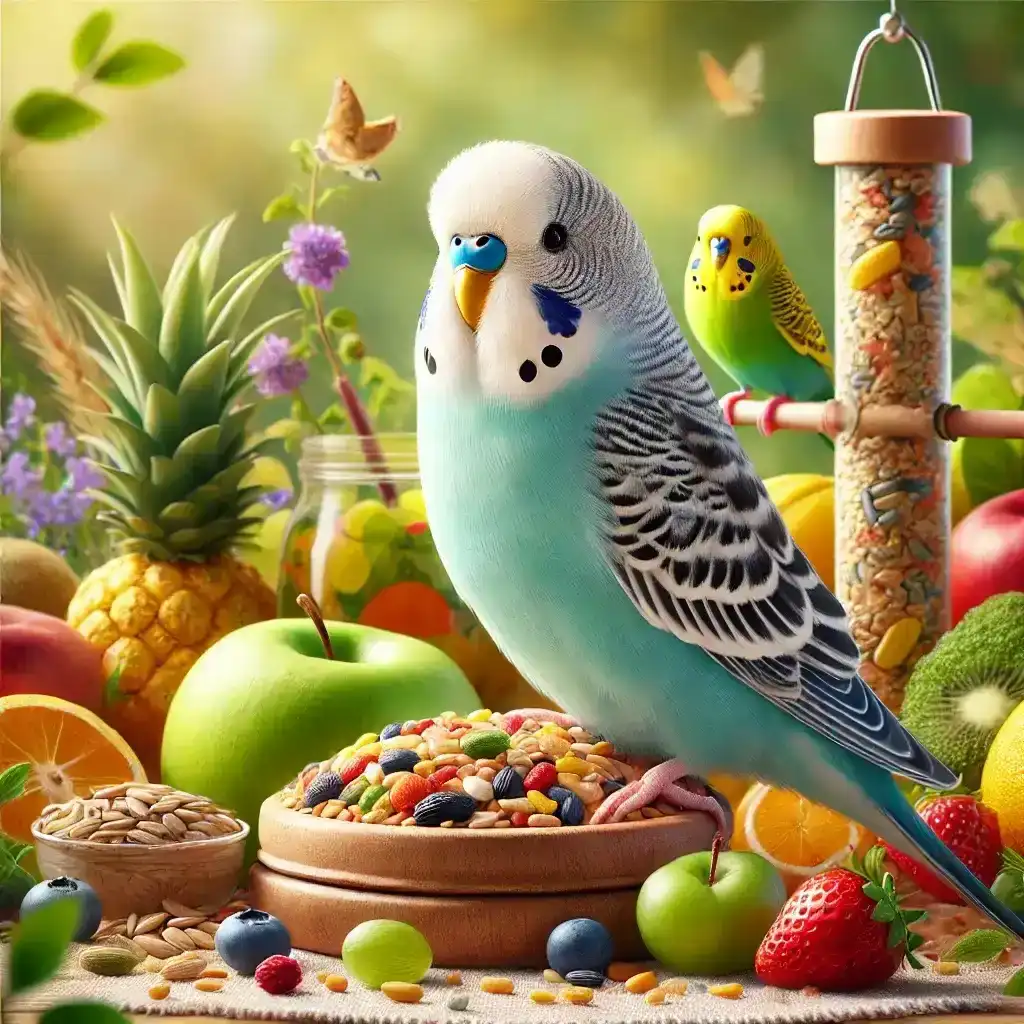Introduction to Budgerigar Diet Myths
When it comes to feeding our feathered friends, particularly budgerigars, there’s a surprising amount of misinformation out there. Budgies, known for their vibrant colors and cheerful chirping, have specific dietary needs that are often overshadowed by common myths. Understanding the best diet for budgerigars is crucial not just for their health, but also for their overall happiness.
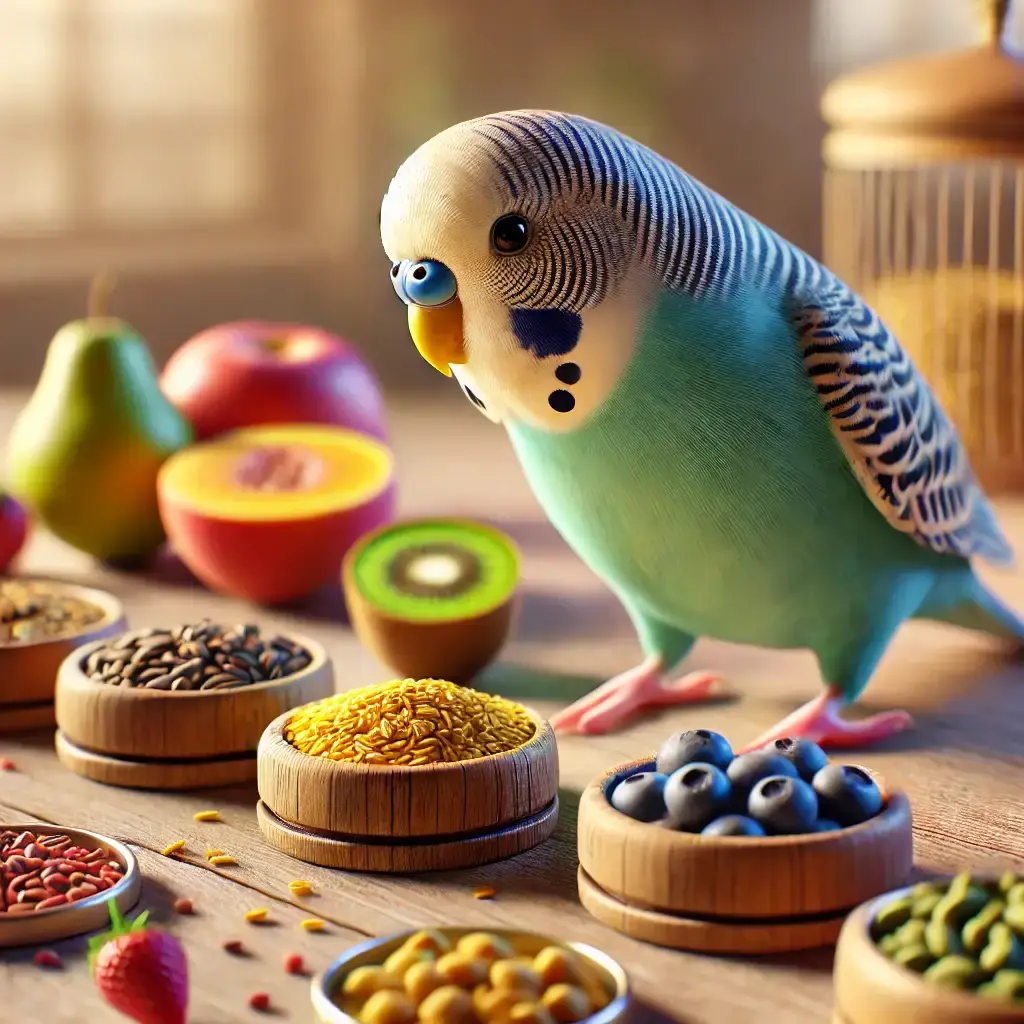
A budgerigar surrounded by a selection of healthy foods, showcasing the diverse diet options available for your bird.
Many budgie owners rely on outdated advice or misleading information, leading to a diet that can be either nutritionally lacking or potentially harmful. For instance, the belief that budgies should survive solely on seeds is widespread, yet this can lead to serious health problems like obesity and malnutrition. Similarly, while fruits and vegetables are beneficial, not all are safe for your budgie, and knowing which ones to avoid is key.
In this blog post, we’ll address some of the most common myths about budgerigar diets, provide a comprehensive budgie feeding guide, and help you understand the nutritional needs of budgerigars. Our goal is to ensure your budgie isn’t just surviving on its diet, but thriving. So, let’s clear up the confusion and set the record straight on what you should and shouldn’t feed your budgie. Join us as we explore healthy budgie foods, toxic foods for budgies, and how to create an optimal diet plan for your feathered companion.
Essential Nutrients for Budgerigars
Understanding the nutritional landscape for budgerigars is key to keeping them vibrant and healthy. Budgies, like all birds, require a balanced mix of carbohydrates, proteins, fats, vitamins, and minerals. Each nutrient plays a pivotal role in their overall health, influencing everything from feather condition to energy levels.
Proteins are crucial for muscle maintenance and growth. Budgies especially need high-quality protein sources in their diet, which can be found in various seeds, legumes, and occasionally, in specially formulated pellets. However, balancing their protein intake is necessary to avoid kidney strain, which is common in these small birds.
Carbohydrates provide the energy budgies need for their active lifestyles. Seeds are a natural source of carbs, but it’s important to mix in other grains and vegetables to provide variety and ensure a well-rounded diet.
Fats should be offered in moderation. They are essential for absorbing certain vitamins and providing energy, but too much fat can lead to health issues like obesity. The right seeds, such as millet and canary seed, contain healthy fats that are beneficial when given as part of a mixed diet.
Vitamins and minerals are indispensable for a budgie’s body to function properly. Calcium, for example, is essential for strong bones and proper muscle function. A lack of calcium can lead to health issues such as weak bones or even metabolic bone disease. Vitamin A is another crucial nutrient; it supports skin, feather health, and vision. Leafy greens and certain fruits can be excellent sources of these nutrients.
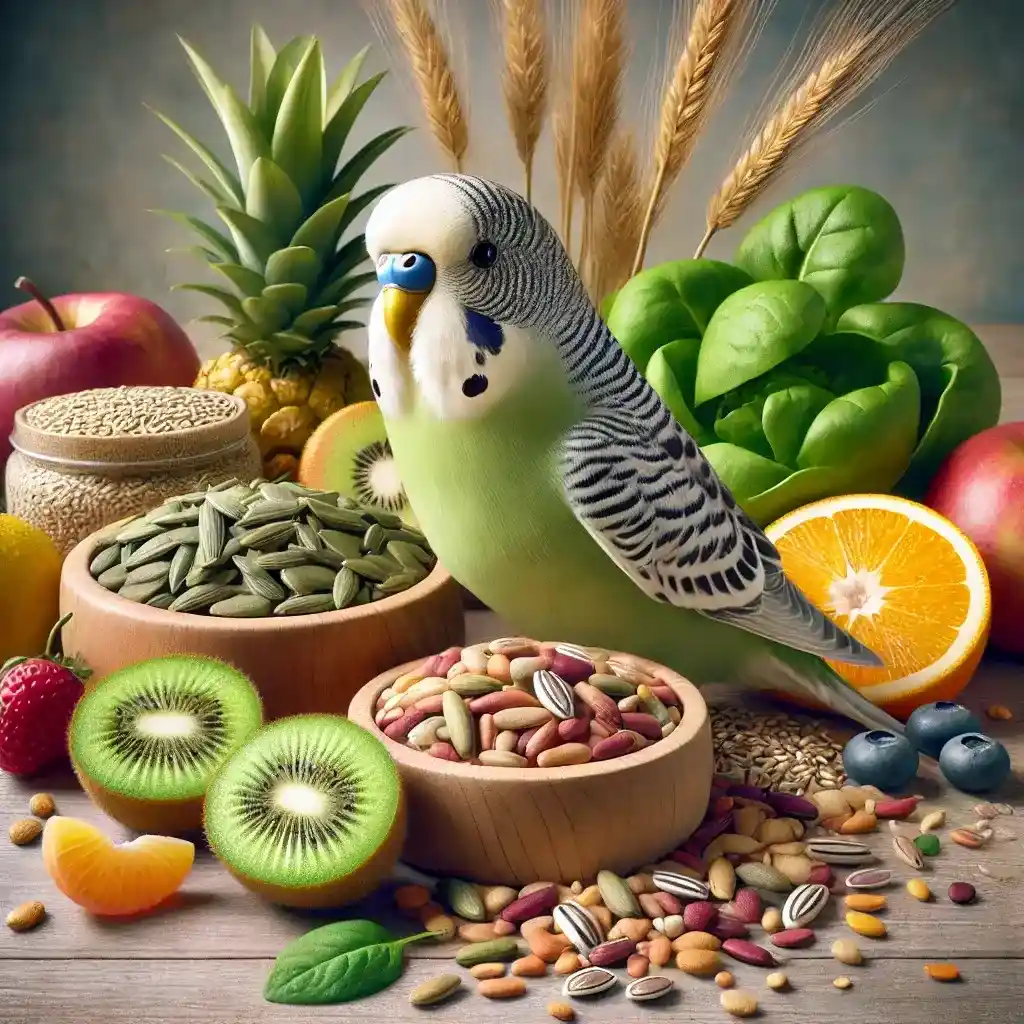
A detailed view of a budgerigar surrounded by an assortment of healthy foods, emphasizing the importance of proper nutrition in a budgie’s diet.
To ensure your budgie is receiving all the necessary nutrients, consider integrating a variety of foods into their diet. This not only prevents nutritional deficiencies but also keeps mealtime interesting for your budgie. Fresh vegetables, a small selection of fruits, and an appropriate amount of fortified seeds or pellets can make up a balanced diet that supports all their bodily functions.
Remember, each budgie is unique, and their dietary needs can vary based on age, health, and activity level. Consulting with a vet who specializes in birds can provide tailored guidance to ensure your budgie’s diet is nutritionally complete.
Common Myths About Budgerigar Diets
When it comes to feeding budgerigars, several myths could lead you astray from providing the best possible diet for your feathered companion. Let’s tackle some of these misconceptions to ensure you’re equipped with the right information.
Myth 1: Budgies Only Need Seeds
One of the most persistent myths is that seeds alone are sufficient for a budgie’s diet. While seeds are an important part of their nutrition, they don’t provide a complete nutritional profile when fed exclusively. Seeds are high in fat and can lead to obesity and other health issues if they constitute the entire diet. Budgies also need fresh vegetables, fruits, and protein sources to meet their dietary requirements.
Myth 2: All Fruits Are Safe for Budgies
While fruits are an excellent source of vitamins and can be a tasty treat for your budgie, not all fruits are safe. Avocado, for example, is toxic to budgerigars and should be avoided at all costs. Citrus fruits should also be limited due to their high acidity, which can upset a budgie’s digestive system.
Myth 3: Budgies Can Eat Dairy Products
Another common misunderstanding is that dairy products are safe for budgies. Budgerigars, like many birds, are lactose intolerant. Foods like milk, cheese, and yogurt can cause digestive problems and should be excluded from their diet.
Myth 4: Budgies Should Have a High-Fat Diet
While it’s true that budgies require some fat in their diet, too much fat is detrimental. High-fat diets can lead to health issues such as fatty liver disease. It’s important to balance their fat intake with other nutrients and ensure that their fat sources come from healthy seeds and occasional nuts suitable for birds.
Addressing these myths is crucial for the well-being of your budgie. By understanding the nutritional needs of budgerigars and what foods to avoid, you can create a diet that promotes health and vitality. Always aim to provide a balanced diet that includes a variety of seeds, grains, vegetables, and the occasional safe fruit to keep your budgie happy and healthy. And remember, when in doubt, consult with a vet specialized in avian care for the best dietary advice.
Safe and Healthy Foods for Your Budgie
Ensuring your budgerigar enjoys a varied and nutritious diet is key to their health and happiness. While seeds should form a part of their daily intake, there’s a whole world of other foods that can enhance their nutritional intake and spice up their mealtime. Here’s a guide to some safe and healthy foods that you can confidently include in your budgie’s diet.
Seeds and Grains: A staple in any budgie diet, seeds should be balanced with other foods. Opt for a mix of millet, canary seeds, and a small proportion of sunflower seeds, which are higher in fat. Grains like cooked quinoa, and small amounts of oatmeal can also be excellent sources of nutrition.
Vegetables: These should form a significant part of your budgie’s diet. Leafy greens like spinach, kale, and romaine lettuce are excellent choices. They’re packed with vitamins and are usually a hit with the birds. Broccoli, carrots, and sweet potatoes are also great as they provide additional nutrients and textures for your budgie to enjoy.
Fruits: While fruits should be given in moderation due to their sugar content, they are a good source of vitamins and can be a tasty treat for your budgie. Safe fruits include apple (seeds removed), banana, and berries such as blueberries and strawberries. Always ensure fruits are washed and cut into manageable pieces to prevent choking.
Sprouted Seeds: Sprouting seeds increase their nutrient content and can be a fun variation in your budgie’s diet. They are easy to digest and rich in enzymes, beneficial for your bird’s overall health.
Herbs and Edibles Flowers: Fresh herbs like cilantro, dill, and basil can be offered to your budgie. Edible flowers such as dandelions and marigolds are also safe and can provide a novel eating experience for your pet.
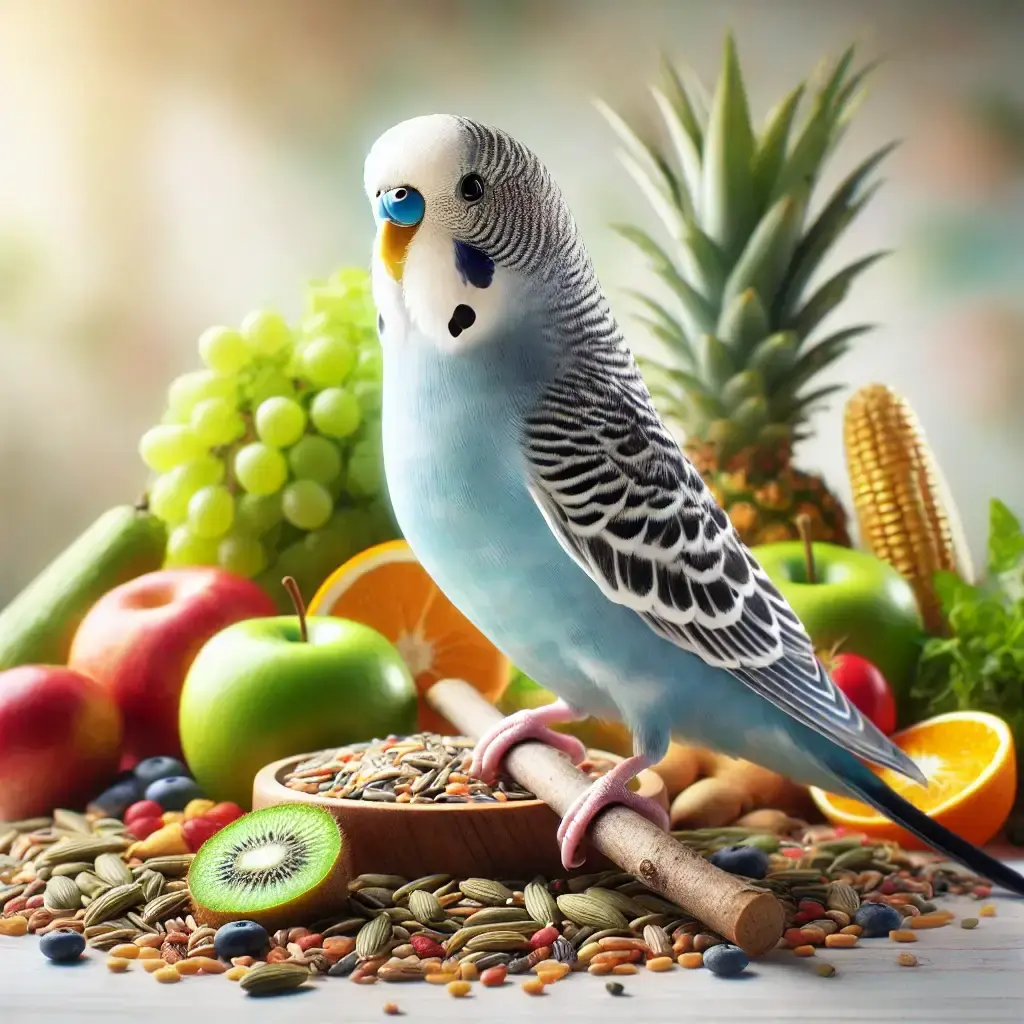
A budgerigar savoring a meal of seeds and fresh fruits, demonstrating the benefits of a well-balanced diet.
When introducing new foods to your budgie, it’s important to do so gradually and observe how they react to each new item. Some budgies might be hesitant at first, so patience is key. Remove any uneaten fresh food after a few hours to prevent spoilage and potential health issues.
By offering a diverse array of safe and healthy foods, you not only cater to the nutritional needs of your budgie but also enrich their daily life, making mealtime a fun and engaging activity. Remember, a happy budgie is a healthy budgie!
Foods to Avoid in a Budgerigar’s Diet
While variety is key to keeping your budgie healthy and happy, it’s equally important to know which foods can be harmful to them. Some foods that are perfectly safe for humans can be dangerous for budgerigars, potentially leading to serious health issues. Here’s a rundown of the foods you should keep out of your budgie’s reach.
Toxic Foods: Certain foods are outright toxic to budgies and should never be offered. Avocado is at the top of this list, as it contains persin, a substance that can cause heart failure in birds. Chocolate is another big no-no, as it contains theobromine and caffeine, which are toxic to most pets, including budgerigars. Also, avoid giving your budgie any fruit seeds or pits, such as apple seeds and cherry pits, which can contain traces of cyanide.
Foods That Cause Digestive Issues: Many budgerigars are lactose intolerant, so dairy products like milk, cheese, and yogurt are best avoided. These can cause stomach upset and digestive problems. Also, while budgies can eat some types of bread or pasta, these should be offered very sparingly as they offer little nutritional value and can lead to obesity.
High-Fat and High-Sugar Foods: Just like in humans, foods that are high in fat and sugar can lead to health problems in budgerigars, such as obesity and diabetes. This includes fatty meats, sugary treats, and even large amounts of high-fat seeds like sunflower seeds, which should be given in moderation as part of a balanced diet.
Onions and Garlic: While these can be healthy for humans, onions and garlic contain compounds that can be harmful to budgerigars, potentially causing anemia or digestive disturbances.
Raw Beans: Raw beans contain hemagglutinin, which is toxic to birds. If you choose to feed beans to your budgie, make sure they are fully cooked to neutralize this toxin.
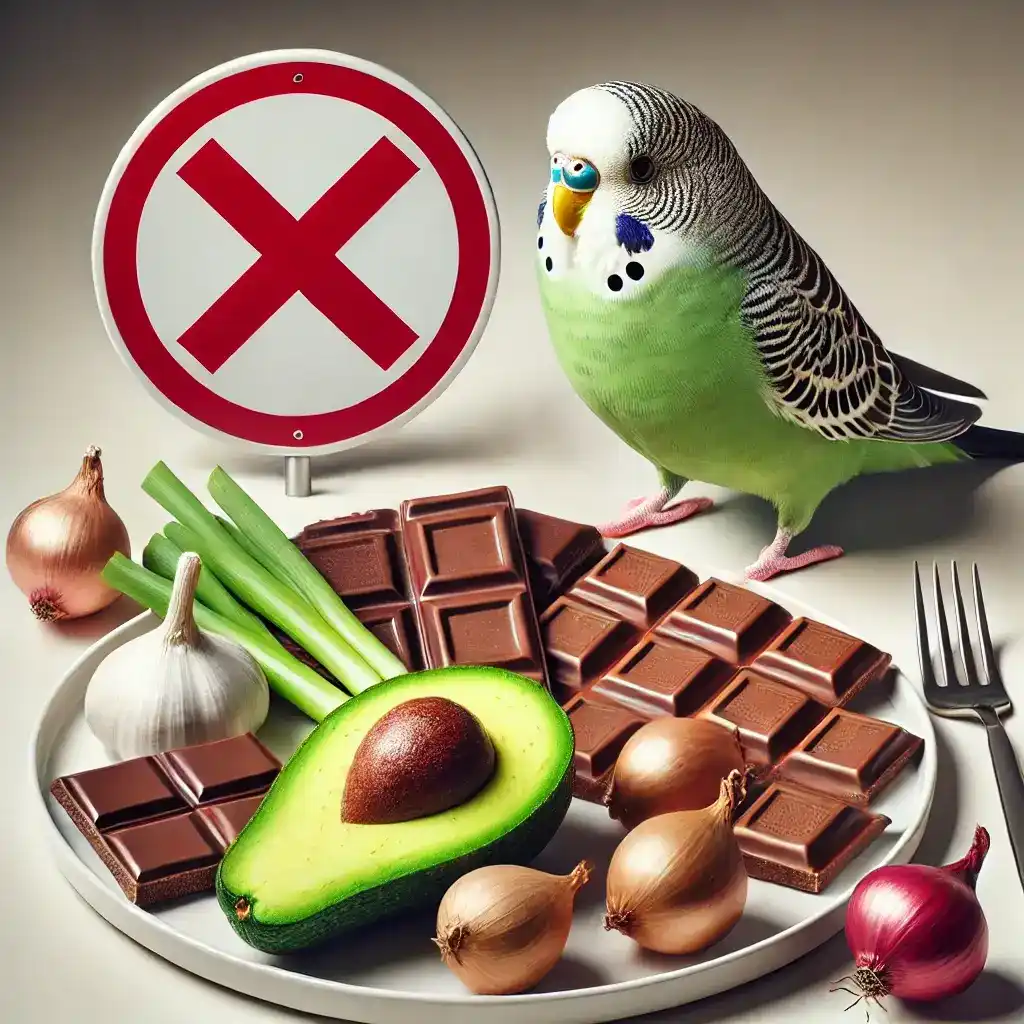
A budgerigar near a plate of harmful foods, including chocolate and avocado, highlighting the dangers of feeding these items to birds.
It’s crucial to maintain a safe and healthy diet for your budgie by avoiding these hazardous foods. Instead, focus on providing a variety of approved fruits, vegetables, and grains that will help keep your budgie in top health. When in doubt about a particular food item, it’s always a good idea to consult with a vet who specializes in avian care to ensure the safety and well-being of your feathered friend.
How to Transition Your Budgie to a Healthier Diet
Changing your budgie’s diet to include more nutritious options is a commendable goal, but it should be approached with care to ensure a smooth transition. Birds can be quite particular about their food, and sudden changes can cause stress or dietary rejection. Here’s a step-by-step guide to help you gradually introduce a healthier diet to your budgie.
Start Small: Begin by mixing small amounts of new foods into the diet your budgie is already accustomed to. For example, if you’re introducing vegetables, you might start with tiny pieces of carrot or broccoli mixed into their usual seed mix. This helps them get used to new textures and flavors without overwhelming them.
Increase Gradually: As your budgie starts to accept the new items, gradually increase the proportion of new foods while decreasing the old diet. This transition should happen over several weeks. Watching your budgie’s reaction to new foods is key; if they are particularly fond of something, you can use that to encourage them to try other new foods.
Variety is Key: Ensure the new diet offers variety not just in flavor but in nutrition too. Incorporate a balanced mix of seeds, fresh vegetables, and the occasional fruit to keep your budgie interested and healthy. Variety will not only meet their nutritional needs but also stimulate them mentally, making mealtime exciting.
Monitor Health and Behavior: Keep an eye on your budgie’s health and behavior throughout the transition. Look for signs of good health such as active engagement, bright eyes, and good feather condition. If you notice any negative changes, such as a drop in energy or reluctance to eat, it might be necessary to adjust the pace of the diet change.
Consult a Veterinarian: If you’re unsure about the dietary needs of your budgie or how to properly implement changes, consulting with an avian veterinarian can be very helpful. They can offer guidance tailored to your budgie’s specific health requirements.
Be Patient: Remember, patience is crucial during this process. Some budgies might switch to a new diet more readily, while others may take longer to accept change. Keep the experience positive by using gentle encouragement and never force your budgie to eat something they are avoiding.
Transitioning your budgie to a healthier diet is a gradual process that requires observation and patience. By introducing new foods slowly and ensuring a balanced diet, you’ll help your budgie embrace a healthier lifestyle that can lead to enhanced vitality and longevity.
Frequently Asked Questions (FAQs)
When it comes to budgerigar care, especially their diet, many owners have questions. Here are answers to some of the most frequently asked questions that can help you provide the best possible care for your budgie.
What is the Best Seed Mix for Budgies? The best seed mix for budgies typically includes a variety of seeds like millet, canary seed, and a small amount of sunflower seeds. Look for mixes that are balanced and designed specifically for budgerigars to ensure they are getting a range of nutrients. Avoid mixes with too many sunflower seeds as they are high in fat.
How Often Should Budgies Eat Fruits and Vegetables? Budgies should have access to fresh vegetables daily. Fruits are also important but should be given in moderation due to their high sugar content—about two to three times a week is sufficient. Always ensure that fruits and vegetables are washed and cut into small, manageable pieces to prevent choking.
Are Pellets or Seeds Better for Budgies? Both pellets and seeds have their place in a budgie’s diet, but pellets are often recommended because they provide a more balanced diet on their own. Seeds can be nutritionally incomplete and high in fat. A combination of pellets, seeds, and fresh produce often works best, ensuring your budgie gets a variety of nutrients.
Can Budgies Eat Chocolate or Avocado? No, both chocolate and avocado are toxic to budgies and should never be included in their diet. Chocolate contains theobromine and caffeine, which are harmful to budgies, and avocado contains persin, a substance that can cause severe health issues and even death in budgerigars.
How Can I Tell if My Budgie Likes Its Food? Budgies usually show their pleasure for certain foods by chirping contentedly and eagerly eating. If they don’t like something, they might toss it aside or simply ignore it. Paying attention to your budgie’s eating habits and preferences can help you tailor their diet more effectively.
Is It Safe to Give My Budgie Tap Water? It’s generally safe, but it depends on the quality of your local tap water. If you’re concerned about contaminants, filtered or bottled water can be a safer option. Always ensure the water is fresh and change it daily to prevent bacterial growth.
By addressing these common questions, you can better understand how to manage your budgie’s dietary needs and overall care, ensuring they lead a healthy, happy life. Remember, when in doubt, it’s always best to consult with an avian veterinarian.
Conclusion: Balancing Your Budgie’s Diet
Ensuring your budgie has a balanced diet is fundamental to their health and longevity. A diet that includes a variety of seeds, fresh fruits, and vegetables, along with the right supplements, can make all the difference in their overall well-being.
Remember, the key to a healthy budgie diet is diversity. Just as humans require a mix of foods to meet their nutritional needs, so do budgerigars. Providing a range of different foods not only meets their nutritional requirements but also keeps mealtime interesting for them. Incorporating a healthy balance of seeds, fresh produce, and quality pellets will help prevent nutritional deficiencies and support optimal health.
Moreover, it’s important to monitor your budgie’s reaction to different foods and adjust their diet accordingly. Each budgie is unique, and their preferences can guide you to understand what works best for their specific dietary needs. Regular consultations with an avian vet can also provide insights into how well your dietary choices are supporting your pet’s health.
Ultimately, the effort you put into balancing your budgie’s diet will reflect in their vibrant feathers, robust energy levels, and the joyful chirping that fills your home. Keep learning, keep observing, and continue to enrich your budgie’s life with the best care possible.

